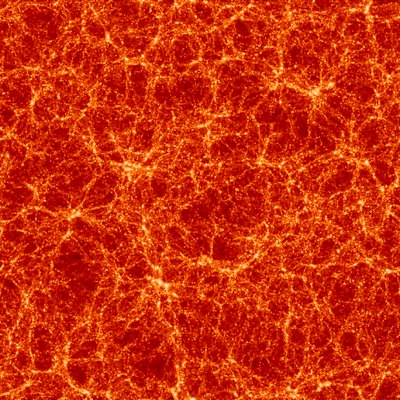


[Images: Density plots of matter in space – whorled lattices of knots and self-intersection – from the Max Planck Institute for Astrophysics].
At the University of Durham, UK, there’s a group of scientists and computer programmers who call themselves the Virgo Consortium for Cosmological Supercomputer Simulations – a name which leads me to wonder who is cosmologically simulating a supercomputer, and why.
But the purpose of the Virgo Consortium is to use “cosmological simulations” to study “the large-scale distribution of dark matter, the formation of dark matter haloes, the formation and evolution of galaxies and clusters, the physics of the intergalactic medium and the properties of the intracluster gas.”
So what’s this got to do with BLDGBLOG…?
Some comments at the end of a recent post made me think of images I’ve seen of intergalactic structure – what the universe looks like: webs of stars in space, huge arc-bubbles of light colliding with themselves in glowing, superskeletal networks, filling space like translucent caulk.
But when I went to find those images again I realized you can actually watch entire films, simulated fly-throughs, of the quantum void, passing through vaults of gravitational foam, and those interstitial spaces seemed perfect for a quick new post.
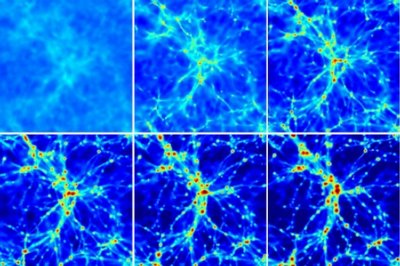
[Image: “Surrounding and stretching between galaxies, there is a rarified gas that is thought to posses a cosmic filamentary structure… This material is called the intergalactic medium (IGM) and is mostly ionized hydrogen (i.e. a plasma).” These images show “the formation of a galaxy cluster.” Structure, it seems, is really a compression or tightening – a focusing – of the surrounding medium. From Craig Booth/The Virgo Consortium].
So the Virgo Consortium, which I’ve mentioned, is a partner of the Max Planck Institute for Astrophysics, and among its tools are a Cosmology Machine and a Sun Grid Engine, both of which surely sound like something straight out of the novels of China Miéville.
Some of the images and simulations these institutes produce, however, are so intensely beautiful that simulations of the universe could perhaps be seen as something of a niche market for starving artists, a new genre of self-expression. Rather than writing novels – you simulate the cosmos. Over and over.
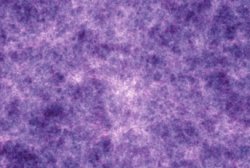
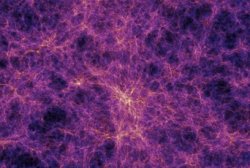

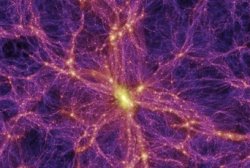
[Images: From the Millennium Simulation; time advances as you go down till “structures are abundant in the universe manifesting themselves as stars, galaxies and clusters.” (Images by the Virgo Consortium)].
So the following short films either take you flying through the universe for all too brief an instant, or they show structure crystallizing out of the universal void-plasma. Either way, enjoy: film 1; film 2 (which seems to portray the universe as a kind of malfunctioning television set); film 3; film 4; and – I like this one – film 5, a kind of slow, hypnotic, black-and-white cosmology as filmed by Jean Cocteau.

[Image: Cosmic filamentary structure – buttresses of light – foregrounded against gravitational darkness: Max Planck Institute].

[Image: A Warholian depiction of the universe: Max Planck Institute].
Another unfortunate instance of the universe imitating Peter Max. Thanks for the heads up G. Physics always makes me want to break something beautiful.
You can hate me for this, but I’ve merged two topics from BLDGBLOG.
The universe has been averaged. Here, and here.
Then I decided to get funky and see what happened when I tweaked it a bit, which turned up some pretty interesting convolutions here,
here, and here.
It’s beginning to look a bit more like bone. Or foam.
Hello e-tat – Doesn’t bother me at all, those are great – you posting those anywhere? And, funny enough, I’ve got a post coming up about architecture made of bone, so… Nice pre-emption. Foreshadowing. Giving away the ending.
What did “tweaking” entail, by the way…?
Be in touch –
I always find it amazing certain shapes and patterns are seen at both the macro and the micro levels. These pics look like ultra-close ups of neurons to me. Somehow, that seems right.
Months later…
Returning to the comments after realizing that there may be things to respond to… and voila, there are!
The tweaking ivolved pasting several sequential images as layers, giving them some transparency, and flattening the bunch. So, serial to vertical conversion.
I haven’t posted those anywhere aside from the blogger archive, but have set up a blog for occasional commentary and wasteful activity at e-tat.
Hey, I made most of those images…